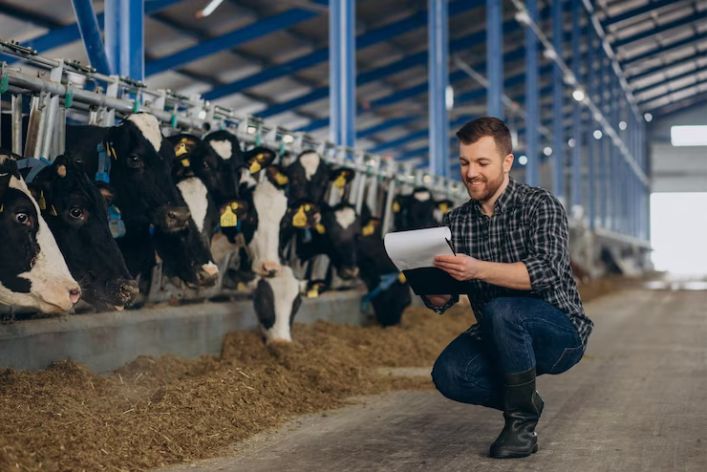Introduction
Livestock farming is a crucial sector of the Nigerian economy. It involves the breeding, raising, and selling of domestic animals such as cattle, goats, sheep, pigs, and poultry on a large scale.
Nigeria’s livestock industry contributes significantly to the country’s food security, employment, and revenue generation. In 2019, the livestock sector accounted for about 2.8% of Nigeria’s Gross Domestic Product (GDP).
The importance of livestock farming in Nigeria can be traced back to early times when herdsmen roamed the countryside with their livestock. Today, the industry has grown to include modern production methods, advanced animal health management practices, and value addition techniques.
Livestock farming is not only a source of protein but also provides raw materials for various industries such as leather and textile. Additionally, the sector offers job opportunities to millions of Nigerians, especially in rural areas.
The purpose of this blog post is to shed light on various livestock farming jobs available in Nigeria and their requirements. The livestock industry has diverse career options that require different skill sets, educational qualifications, and interests.
Understanding these careers can help individuals make informed decisions when choosing a job or a career path in the livestock industry.
Summarily, livestock farming is a significant contributor to the Nigerian economy, providing food, employment, and income opportunities.
This post aims to provide valuable insights into careers in the industry. As you read on, you will discover the range of exciting and rewarding job options in livestock farming, so keep scrolling!
Read: Nigeria’s Agricultural Extension Services: Career Scope
Livestock Farming Jobs in Nigeria
Livestock farming is a crucial sector of the Nigerian economy, providing income and livelihood to thousands of Nigerians. The sector offers numerous job opportunities that come with diverse responsibilities, requirements, salary expectations, job prospects, and growth opportunities.
In this blog post, we will be highlighting the different types of livestock farming jobs available in Nigeria, their responsibilities, salary expectation, job prospects, and challenges.
Types of Livestock Farming Jobs Available
- Livestock Farm Manager: The role of a livestock farm manager involves overseeing the day-to-day operations of a livestock farm. They are responsible for managing and supervising the entire livestock farming process, from breeding to selling.
The job requires an individual with excellent management and organizational skills. A livestock farm manager must possess adequate knowledge of livestock farming practices and techniques.
The salary expectation for a livestock farm manager ranges from N500,000 to N2,000,000 per annum. - Animal Nutritionist: An animal nutritionist is responsible for designing and overseeing feeding programs for livestock. Their primary responsibility is to ensure that livestock receives the right amount and variety of nutrients needed to maintain good health.
To become an animal nutritionist, candidates must possess a degree in Animal Science or related discipline. The salary expectation for an animal nutritionist ranges from N500,000 to N1,500,000 per annum. - Livestock Veterinarian: The role of a livestock veterinarian involves providing medical care to livestock and ensuring that they are healthy.
A livestock veterinarian must have a degree in Veterinary medicine and possess a license to practice. The salary expectation for a livestock veterinarian ranges from N500,000 to N2,000,000 per annum. - Livestock Breeder: A livestock breeder is responsible for breeding quality animals for sale. The job requires an individual with a good understanding of animal genetics, breeding techniques, and breeding cycles. The salary expectation for a livestock breeder ranges from N500,000 to N1,500,000 per annum.
Job Prospects and Opportunities for Growth:
The livestock farming sector in Nigeria continues to offer significant job prospects and opportunities for growth. The government has made efforts to support the sector by providing loans, grants, and subsidies to farmers. With this support, young people are beginning to show interest in livestock farming, leading to more jobs in the sector.
Challenges and Risks Associated with Livestock Farming in Nigeria:
The livestock farming sector in Nigeria is also plagued with several challenges and risks. One of the significant challenges is inadequate funding, which has resulted in low productivity and low-quality livestock.
Also, there are issues of herders-farmers conflicts that pose a risk to the lives and properties of farmers and their livestock. Furthermore, there are inadequate veterinary services and infrastructure, leading to inadequate disease control and animal health issues.
The livestock farming sector in Nigeria offers several job opportunities with diverse responsibilities, salary expectations, and prospects for growth.
The job prospects in the sector are expected to increase in the coming years. However, the sector faces several challenges and risks, ranging from inadequate funding to inadequate veterinary services and infrastructure.
Therefore, the government needs to invest more in the sector to address the challenges and harness the potentials of the sector fully.
Read: Aquaculture Careers: Profiting from Nigeria’s Waters
Skills Required for Livestock Farming Jobs in Nigeria
Livestock farming jobs in Nigeria are not for everyone. It takes a special set of skills and qualities to succeed in this field. Here are the most important skills required for livestock farming jobs in Nigeria:
- Technical Skills: Animal husbandry, breeding, and feeding are all technical skills that are essential for livestock farming jobs in Nigeria.
A good understanding of the anatomy, physiology, and psychology of animals is necessary to carry out these tasks effectively. - Management Skills: Livestock farming requires not only technical but also management skills. Financial management, record-keeping, and staff supervision are all essential skills for successful livestock farming.
Management skills help to ensure that the finances are under control, records are properly maintained, and the staff is working efficiently and effectively. - Personal Qualities: Patience, physical stamina, problem-solving, and communication skills are some of the personal qualities required for livestock farming jobs in Nigeria.
Patience and problem-solving skills help farmers to deal with the unexpected and address challenges that arise.
Physical stamina is necessary to cope with the physical demands of the job, while communication skills are essential for effective team working and customer relations. - Ways to Acquire the Necessary Skills: There are different ways to acquire the necessary skills for livestock farming jobs in Nigeria.
Formal education, on-the-job training, and apprenticeships are some of the ways through which you can gain the necessary skills to succeed in this field.
A combination of these methods can help to create a well-rounded understanding of livestock farming.
Acquire technical skills through formal education and on-the-job training for successful livestock farming in Nigeria. Gain practical experience by working with experienced farmers and apprenticeships, and develop essential qualities for success.
Read: The Rise of Agri-tech Jobs in Nigeria’s Economy

Top Livestock Farms in Nigeria
Nigeria is a country with a vast area of land for agricultural activities, and livestock farming is one of the top agricultural activities that provide job opportunities for Nigerians. The livestock farming industry has grown significantly over the years, and it has become a significant contributor to the country’s economy.
Overview of the leading livestock farms in Nigeria
There are several livestock farms in Nigeria, but some stand above the rest. Here are the top livestock farms in Nigeria:
- Funtuna Farms: Funtuna Farms is known to be one of the largest and most successful commercial cattle farms in Nigeria. The farm has over 10,000 hectares of grazing land and produces over 10,000 litres of milk daily.
- Zartech Farms: Zartech Farms is a poultry farm that also produces eggs and chicken meat. They are known for their high-quality products and have several branches in Nigeria.
- Animal Care Services Konsult: ACSK is a livestock consulting firm and a producer of animal feeds and vaccines. They offer training courses and consultancy services to farmers.
- Chi Farms: Chi Farms is a poultry farm that produces eggs, chicken meat, and turkey. They have a feed mill that produces over 60,000 metric tonnes of feed yearly.
- Amo Farm Sieberer Hatchery: Amo Farm is a poultry farm that specializes in hatching and selling of day-old chicks. They are one of the leading poultry farms in Nigeria.
Employment opportunities available at these farms
The top livestock farms in Nigeria provide various employment opportunities for Nigerians. From veterinary doctors to security personnel, there is a vast range of job positions available. The available positions include:
- Veterinary doctors
- Animal nutritionists
- Farm managers
- Farm hands
- Security personnel
- Accountants
- Administrative officers
Requirements for applying for jobs at these farms
The requirements for applying for jobs at these farms vary depending on the position. However, some of the general requirements include:
- A minimum of a Bachelor’s degree in the relevant field
- Experience in a similar role
- Good communication skills
- Ability to work in a team
- Good organizational skills
- A willingness to learn
Benefits of working for these farms
Working for the top livestock farms in Nigeria comes with several benefits. Some of these benefits include:
- Job security
- Competitive salaries and other benefits
- Opportunities for career growth
- Training and development opportunities
- Access to top-quality agricultural technologies and equipment
- Opportunities to work with experienced professionals
- Opportunities to contribute to the country’s economy
In essence, the livestock farming industry in Nigeria is booming, and the top farms are providing excellent job opportunities for Nigerians. If you are interested in a career in the livestock farming industry, it is advisable to consider applying for a job at one of the top livestock farms in Nigeria.
Read: Role of Agriculture in Nigeria: Career Opportunities
See Related Content: Agricultural Policies Impacting Nigerian Farmers
Future of Livestock Farming Jobs in Nigeria
- The potential for growth in the livestock farming industry in Nigeria is immense.
- The population of Nigeria is expected to double by 2050, resulting in increased demand for animal products.
- There is already a growing demand for meat, milk, and eggs, which is driving the expansion of the industry.
- Changes in technology are also affecting the industry, particularly in the areas of genetics, breeding, and disease control.
- Farmers who are able to incorporate these advancements into their operations are poised to reap significant benefits.
- Additionally, there are government policies and initiatives promoting the industry, such as the Livestock Transformation Plan.
- This plan aims to modernize the livestock sector by encouraging investment, promoting the use of technology, and improving animal health and welfare.
- It is expected to create jobs and boost the country’s GDP.
- Predictions for job growth and availability in the future are optimistic.
- There is a need for skilled workers in areas such as animal nutrition, breeding, health management, and marketing.
- As the industry expands and becomes more modernized, there will be opportunities for entrepreneurs and investors to create value-added products and services.
- Overall, the future of livestock farming jobs in Nigeria looks promising for those willing to embrace change and innovation.
Essentially, the livestock farming industry in Nigeria offers a wealth of job opportunities, both for those with experience in the field and those looking to learn new skills.
As the demand for animal products continues to grow, so too will the need for skilled professionals to support the sector’s expansion.
By keeping up with the latest developments in technology and government initiatives, those in the industry can position themselves to thrive in this exciting and dynamic field.
Conclusion
Finally, livestock farming jobs play a crucial role in Nigeria’s economy, providing income and employment opportunities for millions of people.
For those interested in pursuing a career in the industry, there are various paths to explore, from farming and breeding to consultancy and policy development.
Our hope is that this article has shed some light on the importance and opportunities in livestock farming jobs in Nigeria.
If you are looking for further reading or exploration, there are numerous resources available online, including industry associations, government agencies, and academic institutions.
We encourage anyone interested in this dynamic and important field to continue their research and pursue their passion for livestock farming in Nigeria.




